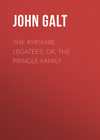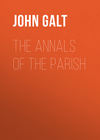Читать книгу: «The Ayrshire Legatees; Or, The Pringle Family», страница 2
LETTER V
The Rev. Dr. Pringle to Mr. Micklewham, Schoolmaster and Session-Clerk, GarnockLondon, 49 Norfolk Street, Strand.
Dear Sir – On the first Sunday forthcoming after the receiving hereof, you will not fail to recollect in the remembering prayer, that we return thanks for our safe arrival in London, after a dangerous voyage. Well, indeed, is it ordained that we should pray for those who go down to the sea in ships, and do business on the great deep; for what me and mine have come through is unspeakable, and the hand of Providence was visibly manifested.
On the day of our embarkation at Leith, a fair wind took us onward at a blithe rate for some time; but in the course of that night the bridle of the tempest was slackened, and the curb of the billows loosened, and the ship reeled to and fro like a drunken man, and no one could stand therein. My wife and daughter lay at the point of death; Andrew Pringle, my son, also was prostrated with the grievous affliction; and the very soul within me was as if it would have been cast out of the body.
On the following day the storm abated, and the wind blew favourable; but towards the heel of the evening it again came vehement, and there was no help unto our distress. About midnight, however, it pleased Him, whose breath is the tempest, to be more sparing with the whip of His displeasure on our poor bark, as she hirpled on in her toilsome journey through the waters; and I was enabled, through His strength, to lift my head from the pillow of sickness, and ascend the deck, where I thought of Noah looking out of the window in the ark, upon the face of the desolate flood, and of Peter walking on the sea; and I said to myself, it matters not where we are, for we can be in no place where Jehovah is not there likewise, whether it be on the waves of the ocean, or the mountain tops, or in the valley and shadow of death.
The third day the wind came contrary, and in the fourth, and the fifth, and the sixth, we were also sorely buffeted; but on the night of the sixth we entered the mouth of the river Thames, and on the morning of the seventh day of our departure, we cast anchor near a town called Gravesend, where, to our exceeding great joy, it pleased Him, in whom alone there is salvation, to allow us once more to put our foot on the dry land.
When we had partaken of a repast, the first blessed with the blessing of an appetite, from the day of our leaving our native land, we got two vacancies in a stage-coach for my wife and daughter; but with Andrew Pringle, my son, I was obligated to mount aloft on the outside. I had some scruple of conscience about this, for I was afraid of my decorum. I met, however, with nothing but the height of discretion from the other outside passengers, although I jealoused that one of them was a light woman. Really I had no notion that the English were so civilised; they were so well bred, and the very duddiest of them spoke such a fine style of language, that when I looked around on the country, I thought myself in the land of Canaan. But it’s extraordinary what a power of drink the coachmen drink, stopping and going into every change-house, and yet behaving themselves with the greatest sobriety. And then they are all so well dressed, which is no doubt owing to the poor rates. I am thinking, however, that for all they cry against them, the poor rates are but a small evil, since they keep the poor folk in such food and raiment, and out of the temptations to thievery; indeed, such a thing as a common beggar is not to be seen in this land, excepting here and there a sorner or a ne’er-do-weel.
When we had got to the outskirts of London, I began to be ashamed of the sin of high places, and would gladly have got into the inside of the coach, for fear of anybody knowing me; but although the multitude of by-goers was like the kirk scailing at the Sacrament, I saw not a kent face, nor one that took the least notice of my situation. At last we got to an inn, called The White Horse, Fetter-Lane, where we hired a hackney to take us to the lodgings provided for us here in Norfolk Street, by Mr. Pawkie, the Scotch solicitor, a friend of Andrew Pringle, my son. Now it was that we began to experience the sharpers of London; for it seems that there are divers Norfolk Streets. Ours was in the Strand (mind that when you direct), not very far from Fetter-Lane; but the hackney driver took us away to one afar off, and when we knocked at the number we thought was ours, we found ourselves at a house that should not be told. I was so mortified, that I did not know what to say; and when Andrew Pringle, my son, rebuked the man for the mistake, he only gave a cunning laugh, and said we should have told him whatna Norfolk Street we wanted. Andrew stormed at this – but I discerned it was all owing to our own inexperience, and put an end to the contention, by telling the man to take us to Norfolk Street in the Strand, which was the direction we had got. But when we got to the door, the coachman was so extortionate, that another hobbleshaw arose. Mrs. Pringle had been told that, in such disputes, the best way of getting redress was to take the number of the coach; but, in trying to do so, we found it fastened on, and I thought the hackneyman would have gone by himself with laughter. Andrew, who had not observed what we were doing, when he saw us trying to take off the number, went like one demented, and paid the man, I cannot tell what, to get us out, and into the house, for fear we should have been mobbit.
I have not yet seen the colonel’s agents, so can say nothing as to the business of our coming; for, landing at Gravesend, we did not bring our trunks with us, and Andrew has gone to the wharf this morning to get them, and, until we get them, we can go nowhere, which is the occasion of my writing so soon, knowing also how you and the whole parish would be anxious to hear what had become of us; and I remain, dear sir, your friend and pastor,
Zachariah Pringle.
On Saturday evening, Saunders Dickie, the Irvine postman, suspecting that this letter was from the Doctor, went with it himself, on his own feet, to Mr. Micklewham, although the distance is more than two miles, but Saunders, in addition to the customary twal pennies on the postage, had a dram for his pains. The next morning being wet, Mr. Micklewham had not an opportunity of telling any of the parishioners in the churchyard of the Doctor’s safe arrival, so that when he read out the request to return thanks (for he was not only school-master and session-clerk, but also precentor), there was a murmur of pleasure diffused throughout the congregation, and the greatest curiosity was excited to know what the dangers were, from which their worthy pastor and his whole family had so thankfully escaped in their voyage to London; so that, when the service was over, the elders adjourned to the session-house to hear the letter read; and many of the heads of families, and other respectable parishioners, were admitted to the honours of the sitting, who all sympathised, with the greatest sincerity, in the sufferings which their minister and his family had endured. Mr. Daff, however, was justly chided by Mr. Craig, for rubbing his hands, and giving a sort of sniggering laugh, at the Doctor’s sitting on high with a light woman. But even Mr. Snodgrass was seen to smile at the incident of taking the number off the coach, the meaning of which none but himself seemed to understand.
When the epistle had been thus duly read, Mr. Micklewham promised, for the satisfaction of some of the congregation, that he would get two or three copies made by the best writers in his school, to be handed about the parish, and Mr. Icenor remarked, that truly it was a thing to be held in remembrance, for he had not heard of greater tribulation by the waters since the shipwreck of the Apostle Paul.
CHAPTER III – THE LEGACY
Soon after the receipt of the letters which we had the pleasure of communicating in the foregoing chapter, the following was received from Mrs. Pringle, and the intelligence it contains is so interesting and important, that we hasten to lay it before our readers: —
LETTER VI
Mrs. Pringle to Miss Mally GlencairnLondon.
My dear Miss Mally – You must not expect no particulars from me of our journey; but as Rachel is writing all the calamities that befell us to Bell Tod, you will, no doubt, hear of them. But all is nothing to my losses. I bought from the first hand, Mr. Treddles the manufacturer, two pieces of muslin, at Glasgow, such a thing not being to be had on any reasonable terms here, where they get all their fine muslins from Glasgow and Paisley; and in the same bocks with them I packit a small crock of our ain excellent poudered butter, with a delap cheese, for I was told that such commodities are not to be had genuine in London. I likewise had in it a pot of marmlet, which Miss Jenny Macbride gave me at Glasgow, assuring me that it was not only dentice, but a curiosity among the English, and my best new bumbeseen goun in peper. Howsomever, in the nailing of the bocks, which I did carefully with my oun hands, one of the nails gaed in ajee, and broke the pot of marmlet, which, by the jolting of the ship, ruined the muslin, rottened the peper round the goun, which the shivers cut into more than twenty great holes. Over and above all, the crock with the butter was, no one can tell how, crackit, and the pickle lecking out, and mixing with the seerip of the marmlet, spoilt the cheese. In short, at the object I beheld, when the bocks was opened, I could have ta’en to the greeting; but I behaved with more composity on the occasion, than the Doctor thought it was in the power of nature to do. Howsomever, till I get a new goun and other things, I am obliged to be a prisoner; and as the Doctor does not like to go to the counting-house of the agents without me, I know not what is yet to be the consequence of our journey. But it would need to be something; for we pay four guineas and a half a week for our dry lodgings, which is at a degree more than the Doctor’s whole stipend. As yet, for the cause of these misfortunes, I can give you no account of London; but there is, as everybody kens, little thrift in their housekeeping. We just buy our tea by the quarter a pound, and our loaf sugar, broken in a peper bag, by the pound, which would be a disgrace to a decent family in Scotland; and when we order dinner, we get no more than just serves, so that we have no cold meat if a stranger were coming by chance, which makes an unco bare house. The servan lasses I cannot abide; they dress better at their wark than ever I did on an ordinaire week-day at the manse; and this very morning I saw madam, the kitchen lass, mounted on a pair of pattens, washing the plain stenes before the door; na, for that matter, a bare foot is not to be seen within the four walls of London, at the least I have na seen no such thing.
In the way of marketing, things are very good here, and considering, not dear; but all is sold by the licht weight, only the fish are awful; half a guinea for a cod’s head, and no bigger than the drouds the cadgers bring from Ayr, at a shilling and eighteenpence apiece.
Tell Miss Nanny Eydent that I have seen none of the fashions as yet; but we are going to the burial of the auld king next week, and I’ll write her a particular account how the leddies are dressed; but everybody is in deep mourning. Howsomever I have seen but little, and that only in a manner from the window; but I could not miss the opportunity of a frank that Andrew has got, and as he’s waiting for the pen, you must excuse haste. From your sincere friend,
Janet Pringle.
LETTER VII
Andrew Pringle, Esq., to the Rev. Charles SnodgrassLondon.
My dear Friend – It will give you pleasure to hear that my father is likely to get his business speedily settled without any equivocation; and that all those prudential considerations which brought us to London were but the phantasms of our own inexperience. I use the plural, for I really share in the shame of having called in question the high character of the agents: it ought to have been warrantry enough that everything would be fairly adjusted. But I must give you some account of what has taken place, to illustrate our provincialism, and to give you some idea of the way of doing business in London.
After having recovered from the effects, and repaired some of the accidents of our voyage, we yesterday morning sallied forth, the Doctor, my mother, and your humble servant, in a hackney coach, to Broad Street, where the agents have their counting-house, and were ushered into a room among other legatees or clients, waiting for an audience of Mr. Argent, the principal of the house.
I know not how it is, that the little personal peculiarities, so amusing to strangers, should be painful when we see them in those whom we love and esteem; but I own to you, that there was a something in the demeanour of the old folks on this occasion, that would have been exceedingly diverting to me, had my filial reverence been less sincere for them.
The establishment of Messrs. Argent and Company is of vast extent, and has in it something even of a public magnitude; the number of the clerks, the assiduity of all, and the order that obviously prevails throughout, give at the first sight, an impression that bespeaks respect for the stability and integrity of the concern. When we had been seated about ten minutes, and my father’s name taken to Mr. Argent, an answer was brought, that he would see us as soon as possible; but we were obliged to wait at least half an hour more. Upon our being at last admitted, Mr. Argent received us standing, and in an easy gentlemanly manner said to my father, “You are the residuary legatee of the late Colonel Armour. I am sorry that you did not apprise me of this visit, that I might have been prepared to give the information you naturally desire; but if you will call here to-morrow at 12 o’clock, I shall then be able to satisfy you on the subject. Your lady, I presume?” he added, turning to my mother; “Mrs. Argent will have the honour of waiting on you; may I therefore beg the favour of your address?” Fortunately I was provided with cards, and having given him one, we found ourselves constrained, as it were, to take our leave. The whole interview did not last two minutes, and I never was less satisfied with myself. The Doctor and my mother were in the greatest anguish; and when we were again seated in the coach, loudly expressed their apprehensions. They were convinced that some stratagem was meditated; they feared that their journey to London would prove as little satisfactory as that of the Wrongheads, and that they had been throwing away good money in building castles in the air.
It had been previously arranged, that we were to return for my sister, and afterwards visit some of the sights; but the clouded visages of her father and mother darkened the very spirit of Rachel, and she largely shared in their fears. This, however, was not the gravest part of the business; for, instead of going to St. Paul’s and the Tower, as we had intended, my mother declared, that not one farthing would they spend more till they were satisfied that the expenses already incurred were likely to be reimbursed; and a Chancery suit, with all the horrors of wig and gown, floated in spectral haziness before their imagination.
We sat down to a frugal meal, and although the remainder of a bottle of wine, saved from the preceding day, hardly afforded a glass apiece, the Doctor absolutely prohibited me from opening another.
This morning, faithful to the hour, we were again in Broad Street, with hearts knit up into the most peremptory courage; and, on being announced, were immediately admitted to Mr. Argent. He received us with the same ease as in the first interview, and, after requesting us to be seated (which, by the way, he did not do yesterday, a circumstance that was ominously remarked), he began to talk on indifferent matters. I could see that a question, big with law and fortune, was gathering in the breasts both of the Doctor and my mother, and that they were in a state far from that of the blessed. But one of the clerks, before they had time to express their indignant suspicions, entered with a paper, and Mr. Argent, having glanced it over, said to the Doctor – “I congratulate you, sir, on the amount of the colonel’s fortune. I was not indeed aware before that he had died so rich. He has left about £120,000; seventy-five thousand of which is in the five per cents; the remainder in India bonds and other securities. The legacies appear to be inconsiderable, so that the residue to you, after paying them and the expenses of Doctors’ Commons, will exceed a hundred thousand pounds.”
My father turned his eyes upwards in thankfulness. “But,” continued Mr. Argent, “before the property can be transferred, it will be necessary for you to provide about four thousand pounds to pay the duty and other requisite expenses.” This was a thunderclap. “Where can I get such a sum?” exclaimed my father, in a tone of pathetic simplicity. Mr. Argent smiled and said, “We shall manage that for you”; and having in the same moment pulled a bell, a fine young man entered, whom he introduced to us as his son, and desired him to explain what steps it was necessary for the Doctor to take. We accordingly followed Mr. Charles Argent to his own room.
Thus, in less time than I have been in writing it, were we put in possession of all the information we required, and found those whom we feared might be interested to withhold the settlement, alert and prompt to assist us.
Mr. Charles Argent is naturally more familiar than his father. He has a little dash of pleasantry in his manner, with a shrewd good-humoured fashionable air, that renders him soon an agreeable acquaintance. He entered with singular felicity at once into the character of the Doctor and my mother, and waggishly drolled, as if he did not understand them, in order, I could perceive, to draw out the simplicity of their apprehensions. He quite won the old lady’s economical heart, by offering to frank her letters, for he is in Parliament. “You have probably,” said he slyly, “friends in the country, to whom you may be desirous of communicating the result of your journey to London; send your letters to me, and I will forward them, and any that you expect may also come under cover to my address, for postage is very expensive.”
As we were taking our leave, after being fully instructed in all the preliminary steps to be taken before the transfers of the funded property can be made, he asked me, in a friendly manner, to dine with him this evening, and I never accepted an invitation with more pleasure. I consider his acquaintance a most agreeable acquisition, and not one of the least of those advantages which this new opulence has put it in my power to attain. The incidents, indeed, of this day, have been all highly gratifying, and the new and brighter phase in which I have seen the mercantile character, as it is connected with the greatness and glory of my country – is in itself equivalent to an accession of useful knowledge. I can no longer wonder at the vast power which the British Government wielded during the late war, when I reflect that the method and promptitude of the house of Messrs. Argent and Company is common to all the great commercial concerns from which the statesmen derived, as from so many reservoirs, those immense pecuniary supplies, which enabled them to beggar all the resources of a political despotism, the most unbounded, both in power and principle, of any tyranny that ever existed so long. – Yours, etc.,
Andrew Pringle.
CHAPTER IV – THE TOWN
There was a great tea-drinking held in the Kirkgate of Irvine, at the house of Miss Mally Glencairn; and at that assemblage of rank, beauty, and fashion, among other delicacies of the season, several new-come-home Clyde skippers, roaring from Greenock and Port-Glasgow, were served up – but nothing contributed more to the entertainment of the evening than a proposal, on the part of Miss Mally, that those present who had received letters from the Pringles should read them for the benefit of the company. This was, no doubt, a preconcerted scheme between her and Miss Isabella Tod, to hear what Mr. Andrew Pringle had said to his friend Mr. Snodgrass, and likewise what the Doctor himself had indited to Mr. Micklewham; some rumour having spread of the wonderful escapes and adventures of the family in their journey and voyage to London. Had there not been some prethought of this kind, it was not indeed probable, that both the helper and session-clerk of Garnock could have been there together, in a party, where it was an understood thing, that not only Whist and Catch Honours were to be played, but even obstreperous Birky itself, for the diversion of such of the company as were not used to gambling games. It was in consequence of what took place at this Irvine route, that we were originally led to think of collecting the letters.
Покупайте книги и получайте бонусы в Литрес, Читай-городе и Буквоеде.
Участвовать в бонусной программе




















